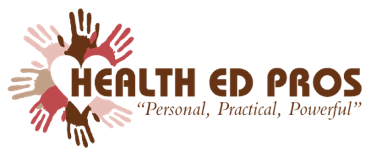Here is a closer look at our student courses...
GENERAL HEALTH
My Amazing Body, Pre-School, 45-60 min
Students use an organ apron to take a look at their amazing bodies inside and out. The importance of physical activity, good nutrition, cleanliness, and rest will be included. Personal safety will be covered along with the importance of taking care of feelings and having healthy relationships.
Stay Healthy, Kindergarten, 45-60 min
Students will review basic body organs while reminding themselves how to keep their bodies healthy. Personal safety, physical activity, healthy foods, and expressing feelings in a healthy way will all be covered. Respect for others, including boundaries and personal space will be emphasized.
All About Me, 1st Grade, 60 min
Students focus on the human body and how to take care of it to keep it healthy. Emphasis will be placed on germs and how to prevent the spread of disease. Students also learn how to identify what is important to them while respecting others. The importance of good nutrition, physical activity, and personal safety will be reviewed.
HUMAN GROWTH & DEVELOPMENT
Here We Grow, 4th grade, 75 min
Students will learn how genes, inherited from their birth parents, determine physical traits. This program allows students to learn about changes they will experience physically and emotionally during puberty. The differences between male and female reproductive anatomy will be discussed as well as how to be respectful of each other. This program is divided boy/girl.
The Facts of Life, 5th grade, 75 min
Students will learn the basic functions of the male and female reproductive anatomy. Human growth and development will be discussed beginning with fertilization, continuing with fetal development throughout pregnancy until birth. Labor and delivery will be briefly discussed. Students will also be equipped to meet the emotional challenges of puberty.
Teen Talk, 6th grade, 45-90 min
Students will gain a positive appreciation of the normal physical/social/emotional changes associated with puberty. Developmentally appropriate knowledge and skills to make decisions now and in the future will be presented. Students will analyze the influence of family, peers, and media on their health behaviors. Healthy relationships and abstinence will be promoted as a standard to guide students through their adolescence.
DISEASE PREVENTION & CONTROL
HIV Prevention, 5th-6th grade, 45-60 min
Students will understand how a healthy immune system keeps bodies healthy even when exposed to various germs. Students will learn how HIV Disease weakens the immune system. Basic facts are covered, dispelling myths, ways in which HIV is transmitted, and universal precautions. It is emphasized that normal everyday activities do not pass HIV from person to person.
BSE (Breast Self-Exam)/TSE (Testicular Self-Exam): Early Detection, High School, 50-70 min
Students learn the importance of correctly performing their monthly breast/testicular self-exams and how their family history can play a role in cancer. In addition, other risk factors that can be related to breast/testicular cancer, signs and symptoms of breast/testicular cancer, and what to do if you find a lump will be discussed. Participants use anatomical models to simulate breast/testicular self-exams and discuss steps to take when a lump is suspected.
ALCOHOL, TOBACCO & OTHER DRUGS
"Drugs: Your Life in Jeopardy", High School, 50-90 min.
Information on basic myths, facts, laws and trends involving alcohol, tobacco, and other drug use. How these substances effect the body and decision making. Marijuana use, the effect on the developing teen brain and perceptions will be discussed.
MENTAL/EMOTIONAL HEALTH
Safe Dates, 7th-9th grade
Safe Dates is an evidence based curriculum that prevents dating abuse. Highly engaging and interactive,Safe Dates helps teens recognize the difference between caring, supportive relationships and controlling, manipulative, or abusive dating relationships. It is a nine-session program that targets attitudes and behaviors associated with dating abuse and violence. Each session is approximately 50 minutes in length.
SDS (Stress, Depression and Suicide): Seeking Help!, High School, 50-70 min
This program will look at stress, effects on the body, and early warning signs of suicide. Students will discuss and learn the consequences of stress and depression and the importance of seeking help. In addition, students will have the opportunity to develop a personal plan for stress reduction, which are their support systems and the resources available for those suffering from thoughts of suicide. Engaging activities and discussion will assist in the learning process.
SAFE SITTER CONTENT AND OPTIONS
Safety Skills: Students learn how to prevent unsafe situations and what to do when faced with dangers such as power failures or weather emergencies.
Child Care Skills: Students learn tips to manage behavior that will help them stay in control of themselves and the children in their care. Students also learn the ages and stages of child development, as well as practice diapering.
First Aid & Rescue Skills: Learning skills such as choking rescue and CPR is often students’ favorite part of the class. Students also learn a system to help them assess and respond to injuries and illnesses.
Life & Business Skills: The ability to screen jobs, discuss fees, and greet employers will set students up for success now and in the future. Students practice these skills through various role plays.
Safe Sitter® Program Options:
Safe Sitter® Essentials, 5½-hour curriculum
Student Course Descriptions
